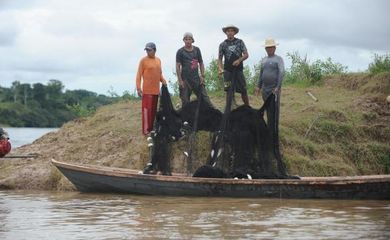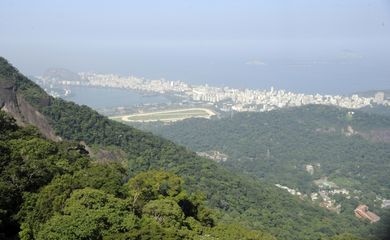Traditional people to be given denial rights over access to plants and animals




Enacted in May, the regulatory framework on biodiversity entitles traditional communities, indigenous peoples and smallholder farmers to deny access of researchers and industry representatives to their knowledge about Brazil's biodiversity and to biodiversity resources (Antonio Cruz/Agência Brasil)
Representatives of traditional communities and indigenous people met for a training workshop on the regulatory framework on access to biodiversity resources, held in Rio Branco, Acre state, last week. The next of a total six regional meetings takes place this week in Belém, Pará, on September 2-4, and a national workshop is slated for October in Brasília.
The events were organized by a working group of the National Commission for Traditional Peoples and Communities and executed by the Genetic Resources Department of the Environment Ministry. They are preparing the communities to grant consent, as required by law, outlining the rules for access to natural resources and traditional knowledge in the territories where these communities hold tenure.
Enacted in May, the regulatory framework on biodiversity entitles traditional communities, indigenous peoples and smallholder farmers to deny access of researchers and industry representatives to their knowledge about Brazil's biodiversity and to biodiversity resources.

The traditional and indigenous communities should hold the decisions and have the authority to manage this knowledge according to their own judgment.
Henry Novion, Project Manager for the Genetic Resources Department of the Environment Ministry, explained that the biodiversity law has provisions assigning the authority to decide how a certain lore is to be used. “It's not [something for] the government, or universities or the company [to decide]. The law provides that the people who have the knowledge will decide how their knowledge may, or may not, be used, in accordance with their customs and traditions. They'll be the party giving the consent,” he said.
Novion explained that the regulatory details of the biodiversity law specify who has the legal authority to grant consent – whether a local association, for example, or an organization or federation that represents the traditional communities and people. The regulatory details must be completed within 180 days of the enactment of the biodiversity law.
Manoel da Silva Cunha is a member of the Mid-Juruá Extractive Reserve and head of the National Council of Extraction-based Communities. He says the community has already agreed on some of the knowledge they are not interested in sharing with the industry and researchers. “We have certain types of plant uses that involve rituals carried out on powers that are not all ours, but have been imparted to us by spirits, and we have no interest in passing them on. But there's a wealth of knowledge and genetic resources out there that have an untapped social and environmental potential. Researchers and businesses can come over and the communities should make this knowledge available. I wouldn't be surprised if the cure for cancer and AIDS were right there just waiting to be found.”
In his opinion, however, the traditional and indigenous communities should hold the decisions and have the authority to manage this knowledge according to their own judgment. “If it [the community] doesn't want to share something, it shouldn't face retaliation or pressure because of that—we should be respected in our decision and judgment. The government shouldn't have the right to tell us what to share and what not to share, and no law should give such powers to companies.”
Anselmo Henrique Cordeiro Lopes, the state prosecutor in the Federal District who represents the Public Prosecution Office in the Genetic Resources Management Council (CGEN), points out that the new regulation should ensure equal opportunities for membership in the council as well as in the managing committee of the profit-sharing fund (which was created by the law to pay royalties on the profits of the use of the traditional knowledge and resources to the communities they originated from).
According to the prosecutor, the terms of the prior informed consent granted by the traditional communities will govern access to genetic resources and related traditional knowledge and grant approval for research, technology development, and commercial and industrial exploitation. “Unless the communities fully understand the concept of prior informed consent, they won't know what their rights are nor be aware that they have the right to be consulted and the authority to grant or deny, in a clear way that is in the best interests of the community,” Lopes said.
Alberto Terena, a native Brazilian in the Buriti community in Mato Grosso do Sul, said that the process leading to his people sharing its knowledge for profit will be far from simple, but he hopes his people will be given denial rights. “Sometimes the laws are no real guarantee, they're there only to be violated or circumvented. And now we'll be under strong pressure coming from the cosmetic and pharmaceutical industry. We want this regulation to really benefit us, but we're aware that we'll be in the middle of industrial competition.”
Translated by Mayra Borges
Fonte: Traditional people to be given denial rights over access to plants and animals





